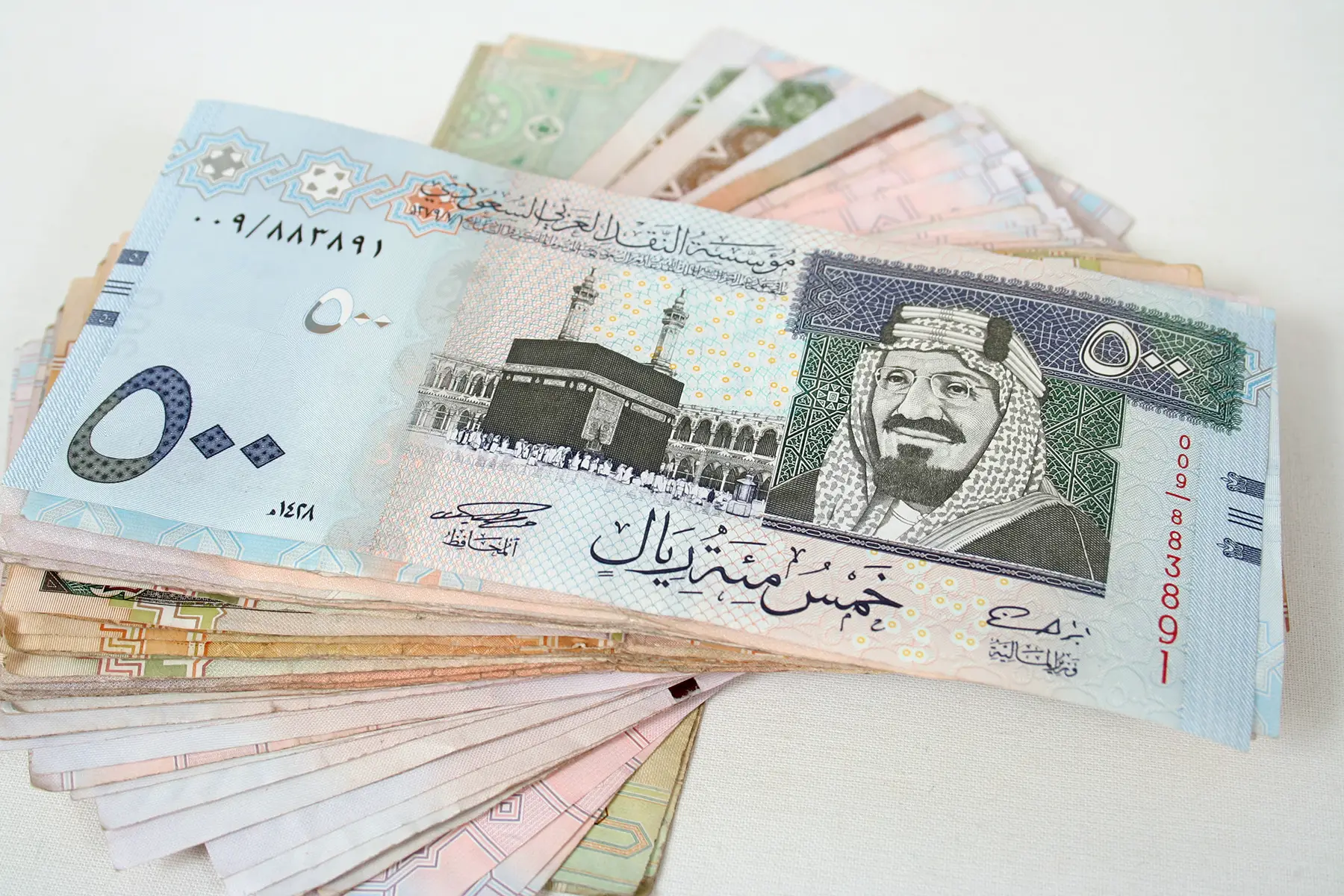The tax system in Saudi Arabia can be tricky to navigate, especially if you’re new to the country and still learning the ropes. While there is no income tax or inheritance tax in the Kingdom, which makes it a very appealing destination for foreigners, there are other types of tax they need to be aware of.
Read on for more information on the following topics:
The tax system in Saudi Arabia
The Saudi Arabian tax system is very unique compared to many other countries, namely because there is no personal income tax. This means that if you are an employee in Saudi Arabia with no other forms of income, you will likely pay no tax on your earnings. In addition, there are no wealth taxes such as inheritance tax, and no stamp duty.

However, Saudi Arabia is not an entirely tax-free country. There are a number of taxes to be aware of, especially if you are an expat or make a living in the country as a non-resident.
- Business taxes – including corporate income tax and self-employed income tax at a standard rate of 20% on business profits; VAT-registered businesses also pay VAT at a standard rate of 15%
- Withholding taxes (WHT) – payable by non-residents on income made in Saudi Arabia, at a rate of between 5% and 20%
- Real estate transaction tax (RETT) – effective from October 2020, this is payable on property transactions at a rate of 5%
- White land tax (WLT) – payable by owners of urban vacant land designated for commercial or residential use at an annual rate of 2.5% of market value
- Social security contributions – paid by Saudi employees at the rate of up to 10% of their salary, with the employer also contributing up to 12%
- Zakat – charitable tax linked to the Islamic faith that contributes towards those in need, charged at 2.5% on the net worth of all Saudi nationals and businesses
The Zakat, Tax, and Customs Authority (ZATCA) is responsible for collecting taxes in Saudi Arabia, and the fiscal year runs from 1 January to 31 December. There are no municipal, regional, or city taxes in Saudi Arabia; all taxes in the country are federal.
What’s new about taxes in 2024?
On 1 January 2024, Saudi Arabia started a 30-year tax relief initiative for multinational corporations operating regional headquarters (RHQ) within the kingdom. Eligible companies will pay zero corporate income taxes and zero withholding tax for approved operations.
Saudi Arabia also further extended the tax amnesty initiative, “Cancellation of Fines and Exemption of Financial Penalties“, introduced in March 2020 to help business mitigate the financial effects of the COVID-19 pandemic. The program now officially runs until 30 June 2024.
Who pays tax in Saudi Arabia?
Your tax obligations in Saudi Arabia depend on whether or not you qualify as a resident for tax purposes. You are a Saudi tax resident if you have permanent residence and live in the country for at least 30 days of the tax year, or if you live in Saudi Arabia for at least 183 days of the tax year.
All residents have to make social security contributions and foreign residents pay business taxes if they are running their own enterprise. Everyone has to pay VAT and excise duties on goods and services. Additionally, Saudi and other GCC nationals must pay Zakat, which is levied on both individuals and businesses. Expats who reside in the country don’t have to pay Zakat but can choose to do so if they wish.
How does tax work for expats?
If you are a non-resident earning money or doing business in Saudi Arabia, such as a consultant carrying out business in the country, you will be charged withholding tax. This is an amount that the individual or company paying you is legally obliged to hold back. Withholding tax is typically 5%, 15%, or 20% depending on the type of business or service carried out.

Non-residents earning an income may also be subject to taxation in their home country, depending on the country’s tax laws. To prevent double taxation (paying tax on your income in two different countries), ZATCA currently has tax agreements in place with 56 other countries.
Expats who are self-employed in the country typically have to pay corporate income tax at the standard rate of 20% on profits.
Finally, citizens of the Kingdom, along with those in other Gulf Cooperation Council (GCC) countries, must also give a small percentage of their net worth to those in need. This is called Zakat. Expats are not required to pay Zakat.
Do I need a tax ID number in Saudi Arabia?
If you are subject to VAT, excise tax, or tax on your commercial activities, you’ll need a tax ID number. You can register for these through the Zakat, Tax and Customs Authority.
Types of tax in Saudi Arabia
Income tax
There is no income tax on employment earnings in Saudi Arabia. However, if you live in the Kingdom and earn money through other sources, you may have to pay tax at the same rate as corporate tax if you have a permanent establishment (PE) there.
Income tax for self-employed workers
Expats usually require special licenses from the Ministry of Investment to run a business or become self-employed in Saudi Arabia. Self-employed income for non-nationals is usually taxed at the same rate as corporate income tax, therefore you will typically have to pay around 20% of your net profits if you run your own enterprise.
There are three main instances where self-employed workers could find themselves in potential violation of the country’s tax laws:
- Being an expat and offering services (e.g., plumbers, electricians, beauticians) without having commercial registration
- Running a business as an expat but under the name of a Saudi national
- Simultaneously working for an employer and on a self-employed basis without an Iqama (national identification) transfer

It is important to note that failing to get the proper registrations and declare the true structure of your self-employed work can also lead to major penalties. For example, the Saudi government can impose a fine of up to SAR 50,000, up to six months of jail time, or even deportation.
Corporate tax
Businesses pay income tax in Saudi Arabia but the amount depends on the nationality of the owner. Generally, non-Saudi and non-GCC investors are liable for 20% corporate income tax on their net-adjusted profits. However, if their income comes from oil and hydrocarbon production, this rises to between 50% and 85% corporate tax.
In most cases, Saudi investors (and those from GCC countries who are considered to be Saudi citizens for Saudi tax purposes) are liable for Zakat. The company is usually charged 2.5% of its Zakat base (the net worth of the company), however, working this out can be quite complicated.
If both Saudi and non-Saudi investors own the company, they will pay both income tax (on the portion of income attributed to non-Saudi sources) and Zakat (on the rest).
Corporate tax credits and rebates
There are tax credits in place for those investing in less-developed regions of the Kingdom. These are Ha’il, Jazan, Najran, Al-Baha, Al-Jouf, and the northern territories. Any project can get tax benefits for a period of 10 years from the start of the project.
Qualifying investing companies are also eligible to have their annual tax bills reduced by:
- Half the annual training expenditure on Saudi employees
- Half the annual salaries paid to Saudi employees
- 15% of the non-Saudi capital share, depending on certain conditions
More tax deductions are available if the investment capital exceeds SAR 1 million, and if more than five Saudi employees have jobs in a technical or administrative field, with contracts of at least one year.
The Saudi government has also created an Integrated Logistics Bonded Zone (ILBZ) close to King Khalid International Airport in Riyadh. Businesses setting up in the zone can benefit from 0% income tax, exemption from withholding tax, suspended customs duty, and more for a period of up to 50 years.
Import and export taxes
Customs duty is payable on imported goods in Saudi Arabia. Most rates are between 0.5% and 15% but can be as high as 25%, depending on the product. For example, imported marble and ceramics, cast iron, and electrical appliances are taxed up to 20%.
Importing machinery and raw materials for certain approved projects may be exempt from customs duty, as long as they are not available in the local market.
You can find all customs rates on the government website and also calculate your likely payment rates.
VAT in Saudi Arabia
Value Added Tax (VAT) was first introduced in Saudi Arabia in January 2018, at a rate of 5%. This increased to 15% in July 2020 and is charged on most goods and services. However, there are a number of exemptions. For instance, you don’t have to pay VAT on the following financial products:
- Islamic finance products that are Shari’ah compliant
- The operation of current, checking, and savings bank accounts
- Life insurance
- Residential real estate leases (excluding hotels and similar short-term rentals)
- The issue or transfer of money or security for a month
- Credit and other financial instruments
- Interest on loans, credit, or debt security

There are also a number of zero-rated (0% rate) products for VAT, such as:
- Certain medical equipment and medicines
- International transport services of goods or passengers, including related products such as vehicles, vehicle maintenance, and spare parts
- Supply of precious metals (such as gold and silver) for investment purposes
- Export of goods and services to non-GCC customers or to outside the GCC region
- Supply of goods and services within customs duty suspension zones
Can you get a refund on VAT?
Non-resident businesses may be able to request a refund on VAT paid in Saudi Arabia. To receive a reimbursement, they will need to make a claim by the end of June following the year the VAT was incurred. For example, those who paid VAT in 2023 will need to submit their claims by 30 June 2024.
VAT for businesses
Resident businesses in Saudi Arabia that have a taxable income exceeding SAR 375,000 must complete VAT registration. Businesses with a smaller turnover can also register voluntarily. Individuals, meanwhile, can register via the government’s portal.
Excise tax
The Excise Tax Law came into force in June 2017. It is only charged on a small number of products that are considered harmful, including:
- Tobacco-related products (100%)
- Soft drinks (50%)
- Energy drinks (100%)
- Sweetened drinks (50%)
- Electronic devices and tools used for smoking, vaping, and similar activities (100%)
- Liquids consumed in electronic devices and tools used for smoking, vaping, and similar activities (100%)
It is important to note that alcohol and pork are not on this list. That is because it is illegal to sell these products within the Kingdom of Saudi Arabia.
Property tax
Capital gains tax
Income arising from capital gains – in other words, profit from property sales – is treated as normal income in Saudi Arabia. Therefore, if it is a business income and you are subject to paying taxes, you could pay as much as 20% of the capital gain.
However, capital gains arising from the sale of stock market shares may be exempt if you fulfill certain conditions. Property sale gains are also exempt from taxation in certain business restructuring cases which you can read about here.
White land tax (WLT)
WLT refers to the 2.5% annual tax that people have to pay when they own urban vacant land designated for residential or commercial use. In essence, the tax acts as a penalty to land owners for not developing the land.
This applies to land that is:
- Vacant
- Allocated for residential or commercial use according to the approved plan issued by the concerned authority
- Located within the limits of the urban boundary
- Located in an area where WLT applies
The Ministry of Municipal, Rural Affairs, and Housing enforce and collect WLT.
Real estate transaction tax (RETT)
Although there is no stamp duty when purchasing property in Saudi Arabia, you will need to factor in real estate transaction tax (RETT) if you sell a property. A flat rate of 5% RETT applies to the sale of any property, including whole properties, the land, what is being built on it, and individual parts of it. You can report a real estate transaction online with ZATCA to ensure RETT compliance.

Notably, Saudi nationals may also be liable for Zakat when selling real estate, depending on how it affects the Zakat base calculation.
Inheritance tax
There are no inheritance or estate taxes in Saudi Arabia. This means that if someone dies, their loved ones do not have to pay taxes on anything they inherit. Moreover, there is no limit on how much you can leave someone in your will.
Payroll and withholding taxes
All people that work in Saudi Arabia contribute to the social security net on a monthly basis. The amount of tax paid depends on the nationality of the employee, as follows:
- Saudi nationals pay a 21.5% rate, which is paid for by both the employer (12%) and the employee (10%)
- GCC Nationals (excluding Saudis) pay between 17% and 22%, which is paid for by the employer (12%) and the employee (the remainder)
- Non-Saudi expats pay only 2% through their employer’s payroll system (this goes towards costs of occupational hazards rather than social insurance such as unemployment benefits or pensions)
If you are a non-resident and receive any income from a business or resident in Saudi Arabia, including those that have a PE, you will usually have to pay withholding tax (WHT). This is typically between 5% and 20%. The domestic rates vary between 5% on dividends and interest, and 15% on royalties.
WHT should be paid during the first 10 days of the month that follows the month in which the payment was made.
Penalties for tax avoidance and evasion
If you fail to submit the required tax information or give false information to the tax authorities in Saudi Arabia, you can face strict financial penalties, such as:
- If you submit false documents to evade the amount of VAT tax due, you can expect to pay a fine of up to three times the amount of VAT
- You can get a fine of 5% to 25% of the tax owed if you fail to submit a tax return
- Failing to keep tax invoices, books, records, and accounting documents could result in a fine of up to SAR 50,000
The ZATCA website provides a list of tax penalties.
Tax advice in Saudi Arabia
ZATCA recently launched an app to assist with the digital management of tax affairs for both individuals and companies.
Although Saudi Arabia doesn’t have a general income tax system, expats in the Kingdom can benefit from tax advice to make sure that their affairs are kept in good order, particularly if they are earning money there. Moreover, professional advice can not only help you avoid penalties but also ensure that tax bills are kept at a reasonable rate.
Useful resources
- The General Authority of Zakat and Tax (GAZT) – the national tax authority which provides guidelines and forms for filing taxes and reporting income
- Saudi Arabia’s National Unified Portal for Government Services – an online portal where you can manage your tax affairs
- Ministry of Investment – provides resources on establishing a business in Saudi Arabia


